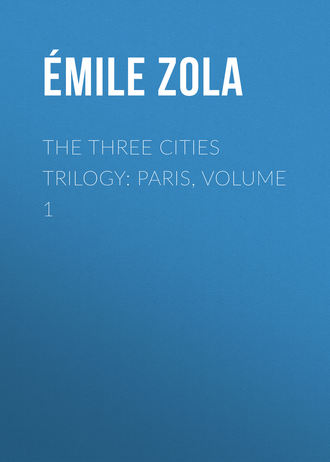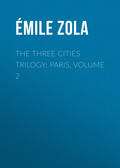
Эмиль Золя
The Three Cities Trilogy: Paris, Volume 1
However, when Pierre wished to cross the Rue Scribe a block in the traffic made him halt. In front of a luxurious cafe two tall, shabbily-clad and very dirty fellows were alternately offering the "Voix du Peuple" with its account of the scandals and the bribe-takers of the Chamber and the Senate, in voices so suggestive of cracked brass that passers-by clustered around them. And here, in a hesitating, wandering man, who after listening drew near to the large cafe and peered through its windows, Pierre was once again amazed to recognise Salvat. This time the meeting struck him forcibly, filled him with suspicion to such a point that he also stopped and resolved to watch the journeyman engineer. He did not expect that one of such wretched aspect, with what seemed to be a hunk of bread distending his old ragged jacket, would enter and seat himself at one of the cafe's little tables amidst the warm gaiety of the lamps. However, he waited for a moment, and then saw him wander away with slow and broken steps as if the cafe, which was nearly empty, did not suit him. What could he have been seeking, whither had he been going, since the morning, ever on a wild, solitary chase through the Paris of wealth and enjoyment while hunger dogged his steps? It was only with difficulty that he now dragged himself along, his will and energy seemed to be exhausted. As if quite overcome, he drew near to a kiosk, and for a moment leant against it. Then, however, he drew himself up again, and walked on further, still as it were in search of something.
And now came an incident which brought Pierre's emotion to a climax. A tall sturdy man on turning out of the Rue Caumartin caught sight of Salvat, and approached him. And just as the new comer without false pride was shaking the workman's hand, Pierre recognised him as his brother Guillaume. Yes, it was indeed he, with his thick bushy hair already white like snow, though he was but seven and forty. However, his heavy moustaches had remained quite dark without one silver thread, thus lending an expression of vigorous life to his full face with its lofty towering brow. It was from his father that he had inherited that brow of impregnable logic and reason, similar to that which Pierre himself possessed. But the lower part of the elder brother's countenance was fuller than that of his junior; his nose was larger, his chin was square, and his mouth broad and firm of contour. A pale scar, the mark of an old wound, streaked his left temple. And his physiognomy, though it might at first seem very grave, rough, and unexpansive, beamed with masculine kindliness whenever a smile revealed his teeth, which had remained extremely white.
While looking at his brother, Pierre remembered what Madame Theodore had told him that morning. Guillaume, touched by Salvat's dire want, had arranged to give him a few days' employment. And this explained the air of interest with which he now seemed to be questioning him, while the engineer, whom the meeting disturbed, stamped about as if eager to resume his mournful ramble. For a moment Guillaume appeared to notice the other's perturbation, by the embarrassed answers which he obtained from him. Still, they at last parted as if each were going his way. Then, however, almost immediately, Guillaume turned round again and watched the other, as with harassed stubborn mien he went off through the crowd. And the thoughts which had come to Guillaume must have been very serious and very pressing, for he all at once began to retrace his steps and follow the workman from a distance, as if to ascertain for certain what direction he would take.
Pierre had watched the scene with growing disquietude. His nervous apprehension of some great unknown calamity, the suspicions born of his frequent and inexplicable meetings with Salvat, his surprise at now seeing his brother mingled with the affair, all helped to fill him with a pressing desire to know, witness, and perhaps prevent. So he did not hesitate, but began to follow the others in a prudent way.
Fresh perturbation came upon him when first Salvat and then Guillaume suddenly turned into the Rue Godot-de-Mauroy. What destiny was thus bringing him back to that street whither a little time previously he had wished to return in feverish haste, and whence only the death of Laveuve had kept him? And his consternation increased yet further when, after losing sight of Salvat for a moment, he saw him standing in front of the Duvillard mansion, on the same spot where he had fancied he recognised him that morning. As it happened the carriage entrance of the mansion was wide open. Some repairs had been made to the paving of the porch, and although the workmen had now gone off, the doorway remained gaping, full of the falling night. The narrow street, running from the glittering Boulevard, was steeped in bluish gloom, starred at long intervals by a few gas-lamps. Some women went by, compelling Salvat to step off the foot-pavement. But he returned to it again, lighted the stump of a cigar, some remnant which he had found under a table outside a cafe, and then resumed his watch, patient and motionless, in front of the mansion.
Disturbed by his dim conjectures, Pierre gradually grew frightened, and asked himself if he ought not to approach that man. The chief thing that detained him was the presence of his brother, whom he had seen disappear into a neighbouring doorway, whence he also was observing the engineer, ready to intervene. And so Pierre contented himself with not losing sight of Salvat, who was still waiting and watching, merely taking his eyes from the mansion in order to glance towards the Boulevard as though he expected someone or something which would come from that direction. And at last, indeed, the Duvillards' landau appeared, with coachman and footman in livery of green and gold – a closed landau to which a pair of tall horses of superb build were harnessed in stylish fashion.
Contrary to custom, however, the carriage, which at that hour usually brought the father and mother home, was only occupied that evening by the son and daughter, Hyacinthe and Camille. Returning from the Princess de Harn's matinee, they were chatting freely, with that calm immodesty by which they sought to astonish one another. Hyacinthe, influenced by his perverted ideas, was attacking women, whilst Camille openly counselled him to respond to the Princess's advances. However, she was visibly irritated and feverish that evening, and, suddenly changing the subject, she began to speak of their mother and Gerard de Quinsac.
"But what can it matter to you?" quietly retorted Hyacinthe; and, seeing that she almost bounded from the seat at this remark, he continued: "Are you still in love with him, then? Do you still want to marry him?"
"Yes, I do, and I will!" she cried with all the jealous rage of an uncomely girl, who suffered so acutely at seeing herself spurned whilst her yet beautiful mother stole from her the man she wanted.
"You will, you will!" resumed Hyacinthe, well pleased to have an opportunity of teasing his sister, whom he somewhat feared. "But you won't unless he is willing – And he doesn't care for you."
"He does!" retorted Camille in a fury. "He's kind and pleasant with me, and that's enough."
Her brother felt afraid as he noticed the blackness of her glance, and the clenching of her weak little hands, whose fingers bent like claws. And after a pause he asked: "And papa, what does he say about it?"
"Oh, papa! All that he cares about is the other one."
Then Hyacinthe began to laugh.
But the landau, with its tall horses trotting on sonorously, had turned into the street and was approaching the house, when a slim fair-haired girl of sixteen or seventeen, a modiste's errand girl with a large bandbox on her arm, hastily crossed the road in order to enter the arched doorway before the carriage. She was bringing a bonnet for the Baroness, and had come all along the Boulevard musing, with her soft blue eyes, her pinky nose, and her mouth which ever laughed in the most adorable little face that one could see. And it was at this same moment that Salvat, after another glance at the landau, sprang forward and entered the doorway. An instant afterwards he reappeared, flung his lighted cigar stump into the gutter; and without undue haste went off, slinking into the depths of the vague gloom of the street.
And then what happened? Pierre, later on, remembered that a dray of the Western Railway Company in coming up stopped and delayed the landau for a moment, whilst the young errand girl entered the doorway. And with a heart-pang beyond description he saw his brother Guillaume in his turn spring forward and rush into the mansion as though impelled to do so by some revelation, some sudden certainty. He, Pierre, though he understood nothing clearly, could divine the approach of some frightful horror. But when he would have run, when he would have shouted, he found himself as if nailed to the pavement, and felt his throat clutched as by a hand of lead. Then suddenly came a thunderous roar, a formidable explosion, as if the earth was opening, and the lightning-struck mansion was being annihilated. Every window-pane of the neighbouring houses was shivered, the glass raining down with the loud clatter of hail. For a moment a hellish flame fired the street, and the dust and the smoke were such that the few passers-by were blinded and howled with affright, aghast at toppling, as they thought, into that fiery furnace.
And that dazzling flare brought Pierre enlightenment. He once more saw the bomb distending the tool-bag, which lack of work had emptied and rendered useless. He once more saw it under the ragged jacket, a protuberance caused, he had fancied, by some hunk of bread, picked up in a corner and treasured that it might be carried home to wife and child. After wandering and threatening all happy Paris, it was there that it had flared, there that it had burst with a thunder-clap, there on the threshold of the sovereign bourgeoisie to whom all wealth belonged. He, however, at that moment thought only of his brother Guillaume, and flung himself into that porch where a volcanic crater seemed to have opened. And at first he distinguished nothing, the acrid smoke streamed over all. Then he perceived the walls split, the upper floor rent open, the paving broken up, strewn with fragments. Outside, the landau which had been on the point of entering, had escaped all injury; neither of the horses had been touched, nor was there even a scratch on any panel of the vehicle. But the young girl, the pretty, slim, fair-haired errand girl, lay there on her back, her stomach ripped open, whilst her delicate face remained intact, her eyes clear, her smile full of astonishment, so swiftly and lightning-like had come the catastrophe. And near her, from the fallen bandbox, whose lid had merely come unfastened, had rolled the bonnet, a very fragile pink bonnet, which still looked charming in its flowery freshness.
By a prodigy Guillaume was alive and already on his legs again. His left hand alone streamed with blood, a projectile seemed to have broken his wrist. His moustaches moreover had been burnt, and the explosion by throwing him to the ground had so shaken and bruised him that he shivered from head to feet as with intense cold. Nevertheless, he recognised his brother without even feeling astonished to see him there, as indeed often happens after great disasters, when the unexplained becomes providential. That brother, of whom he had so long lost sight, was there, naturally enough, because it was necessary that he should be there. And Guillaume, amidst the wild quivers by which he was shaken, at once cried to him "Take me away! take me away! To your house at Neuilly, oh! take me away!"
Then, for sole explanation, and referring to Salvat, he stammered: "I suspected that he had stolen a cartridge from me; only one, most fortunately, for otherwise the whole district would have been blown to pieces. Ah! the wretched fellow! I wasn't in time to set my foot upon the match."
With perfect lucidity of mind, such as danger sometimes imparts, Pierre, neither speaking nor losing a moment, remembered that the mansion had a back entrance fronting the Rue Vignon. He had just realised in what serious peril his brother would be if he were found mixed up in that affair. And with all speed, when he had led him into the gloom of the Rue Vignon, he tied his handkerchief round his wrist, which he bade him press to his chest, under his coat, as that would conceal it.
But Guillaume, still shivering and haunted by the horror he had witnessed, repeated: "Take me away – to your place at Neuilly – not to my home."
"Of course, of course, be easy. Come, wait here a second, I will stop a cab."
In his eagerness to procure a conveyance, Pierre had brought his brother down to the Boulevard again. But the terrible thunderclap of the explosion had upset the whole neighbourhood, horses were still rearing, and people were running demented, hither and thither. And numerous policemen had hastened up, and a rushing crowd was already blocking the lower part of the Rue Godot-de-Mauroy, which was now as black as a pit, every light in it having been extinguished; whilst on the Boulevard a hawker of the "Voix du Peuple" still stubbornly vociferated: "The new scandal of the African Railway Lines! The thirty-two bribe-takers of the Chamber and the Senate! The approaching fall of the ministry!"
Pierre was at last managing to stop a cab when he heard a person who ran by say to another, "The ministry? Ah, well! that bomb will mend it right enough!"
Then the brothers seated themselves in the cab, which carried them away. And now, over the whole of rumbling Paris black night had gathered, an unforgiving night, in which the stars foundered amidst the mist of crime and anger that had risen from the house-roofs. The great cry of justice swept by amidst the same terrifying flapping of wings which Sodom and Gomorrah once heard bearing down upon them from all the black clouds of the horizon.






